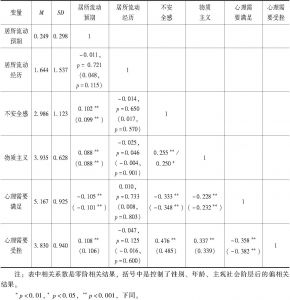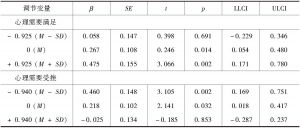论文
居所流动预期能预测个体物质主义价值观
摘要
居所流动预期是个人对未来居所是否发生变化的估计。本研究在已有居所流动性,以及居所流动预期理论和研究的基础上进一步提出有调节的中介作用模型,居所流动预期通过增加个体不安全感而进一步增强个体物质主义价值观倾向,同时心理需要在居所流动预期与个体不安全感之间起调节作用。随后的问卷调查和数据分析结果验证了上述理论模型。最后本研究讨论了上述研究结果对思考中国的居所流动现象、构建居所流动性的概念、扩展居所流动预期的已有研究,以及考察物质主义成因研究的意义,并指出了研究的局限和未来研究的发展方向。
作者
周静 ,江汉大学教育学院心理学系讲师。
谢天 ,心理学博士,外国哲学博士后,武汉大学哲学学院心理学系副教授、硕士生导师。中国社会心理学会理事、中国心理学会社会心理学分会理事,中国社会心理学会文化心理学分会秘书长,Asian Journal of Social Psychology编委(2021~2023年)。从事社会心理学研究,主要研究方向为文化心理、决策与谈判心理等,主持和参与国内外及省部级项目多项。在国内核心期刊,如《心理学报》《心理科学》《心理科学进展》《应用心理学》等,以及国外SSCI期刊,如Journal of CrossCultural Psychology, Asian Journal of Social Psychology, Public Personnel Management等,以第一作者或通讯作者身份发表论文多篇。电子信箱:thanksky520@126.com
检索正文关键字
论文目录
-
一 引言
- (一)居所流动性
- (二)居所流动性与安全感
- (三)不安全感与物质主义
- (四) 作为边界调节的心理需要
-
二 方法
- (一)被试
- (二)施测程序
- (三)测量
- (四)数据处理
-
三 结果
- (一)共同方法偏差检验
- (二)描述性分析
- (三)回归分析
- (四)中介效应分析
- (五)调节效应分析
- (六)有调节的中介效应分析
-
四 讨论
- (一)对已有居所流动性研究的意义
- (二)对居所流动预期研究的意义
- (三)对物质主义研究的意义
- (四)研究局限与未来发展方向
相关文献
查看更多>>>












